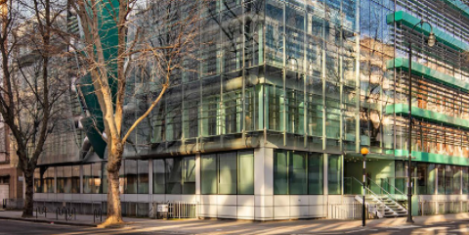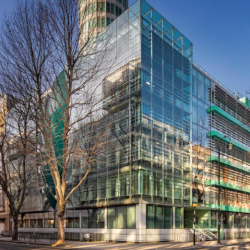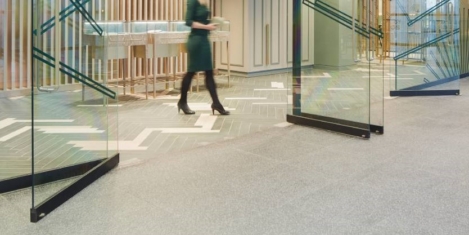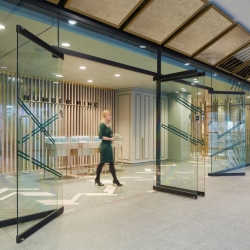To provide the best experiences, we use technologies like cookies to store and/or access device information. Consenting to these technologies will allow us to process data such as browsing behaviour or unique IDs on this site. Not consenting or withdrawing consent, may adversely affect certain features and functions.
The technical storage or access is strictly necessary for the legitimate purpose of enabling the use of a specific service explicitly requested by the subscriber or user, or for the sole purpose of carrying out the transmission of a communication over an electronic communications network.
The technical storage or access is necessary for the legitimate purpose of storing preferences that are not requested by the subscriber or user.
The technical storage or access that is used exclusively for statistical purposes.
The technical storage or access that is used exclusively for anonymous statistical purposes. Without a subpoena, voluntary compliance on the part of your Internet Service Provider, or additional records from a third party, information stored or retrieved for this purpose alone cannot usually be used to identify you.
The technical storage or access is required to create user profiles to send advertising, or to track the user on a website or across several websites for similar marketing purposes.
 Despite their best intentions, most employers are facing difficulties responding to changing employee expectations around employee experience and wellbeing during the pandemic. 69 percent of HR leaders admit that their efforts to improve employee experience are being held back by a lack of a clear strategy, and 76 percent report that they are struggling to adapt their employee experience to meet the needs of a hybrid workforce. (more…)
Despite their best intentions, most employers are facing difficulties responding to changing employee expectations around employee experience and wellbeing during the pandemic. 69 percent of HR leaders admit that their efforts to improve employee experience are being held back by a lack of a clear strategy, and 76 percent report that they are struggling to adapt their employee experience to meet the needs of a hybrid workforce. (more…)






 A new report expresses scepticism about the UK government’s current net zero strategy for the country’s buildings, with 69 percent of built environment professionals doubting its feasibility. The research, published in the City of Tomorrow report by building performance analysts
A new report expresses scepticism about the UK government’s current net zero strategy for the country’s buildings, with 69 percent of built environment professionals doubting its feasibility. The research, published in the City of Tomorrow report by building performance analysts 
 According to a
According to a 
 The
The 
 New research from
New research from 
 Pressing the ‘reset’ button is never easy. But I’m a firm believer that, once we do, we become much less averse than we perhaps expected to the change it inevitably brings. This is particularly true of the past eighteen months. From all of the sadness and hardship endured, we are beginning to emerge into a new, changed way of living. One that is both familiar and altogether different. The dichotomy is particularly evident in our workplaces. For many sections of the economy, the office was the ecosystem of our daily working lives. Initial questions of whether the office would survive quickly fell by the wayside, and a more interesting, nuanced, debate of what we want the office to be began.
Pressing the ‘reset’ button is never easy. But I’m a firm believer that, once we do, we become much less averse than we perhaps expected to the change it inevitably brings. This is particularly true of the past eighteen months. From all of the sadness and hardship endured, we are beginning to emerge into a new, changed way of living. One that is both familiar and altogether different. The dichotomy is particularly evident in our workplaces. For many sections of the economy, the office was the ecosystem of our daily working lives. Initial questions of whether the office would survive quickly fell by the wayside, and a more interesting, nuanced, debate of what we want the office to be began. 
 The workplace power dynamic has shifted in favour of employees, according to a new study released from BCW in partnership with Workplace from Facebook (now Meta of course). The inaugural
The workplace power dynamic has shifted in favour of employees, according to a new study released from BCW in partnership with Workplace from Facebook (now Meta of course). The inaugural 
 Just 41 percent of UK organisations are on track to meet the Government’s target for net zero carbon emissions by 2050, according to new research released by Dr Chris Brauer,
Just 41 percent of UK organisations are on track to meet the Government’s target for net zero carbon emissions by 2050, according to new research released by Dr Chris Brauer, 
 The latest research from
The latest research from 
 Three-quarters of tech leaders think Gen Z will solve the digital skills shortage (72 percent), with an even higher number (77 percent) believing these ‘digital-natives’ have the best ability of any generation. However, while half of Gen Z have a career in tech or firm plans to pursue one in the next five years (46 percent), they have low confidence in their digital abilities.
Three-quarters of tech leaders think Gen Z will solve the digital skills shortage (72 percent), with an even higher number (77 percent) believing these ‘digital-natives’ have the best ability of any generation. However, while half of Gen Z have a career in tech or firm plans to pursue one in the next five years (46 percent), they have low confidence in their digital abilities. 
 At a recent
At a recent 







November 1, 2021
The modern workplace is defined as much by digital space as the physical office
by Wilco Wijnbergen • Comment, Property, Technology